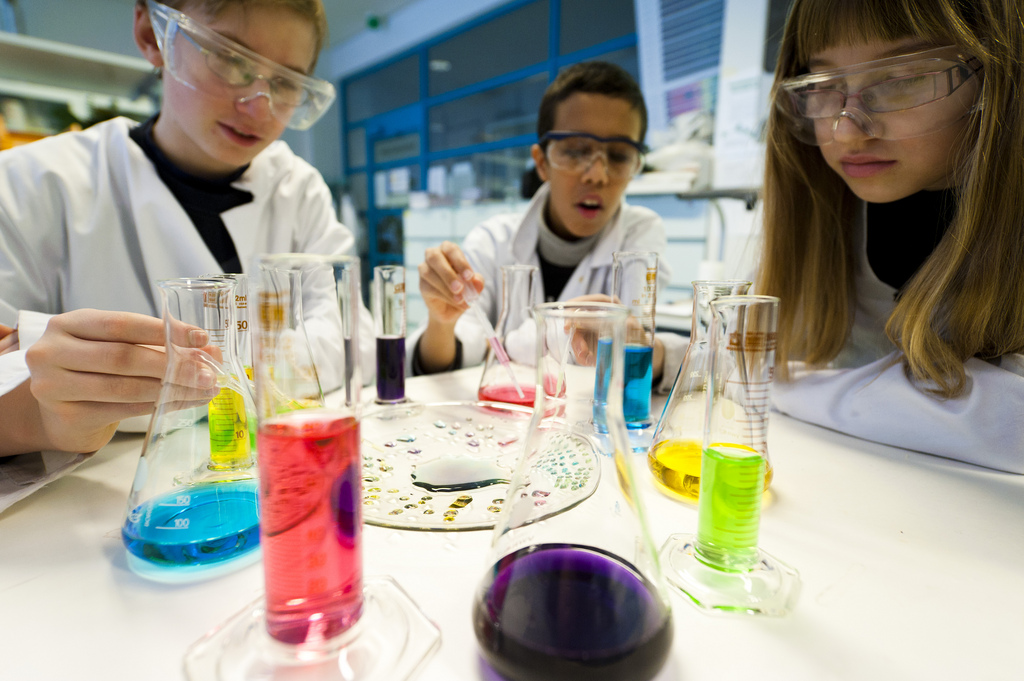The ChemistryLab Gadolin launched ten years ago, can interest children and young people in science through novel solutions and pedagogical innovations, as well as educate teachers in them. The work of ChemistryLab Gadolin has received international acclaim, as well.
ChemistryLab GadolinThe first decade of the ChemistryLab Gadolin is celebrated with the publication of a commemorative volume, Collaborative Science Education at the University of Helsinki: ChemistryLab Gadolin – A Science Lab as an Inspiring Environment for Learning, Development and Research since 2008. School classes can visit the ChemistryLab Gadolin. At the same time, their teachers can learn about new chemistry-teaching methods and innovations during visits conducted by future teachers. Also the experts within the education field etc. may visit the centre. Usually these visits include a presentation of the collaborative ecosystem and of the activities on general level. Visit might also include observation of the activities in one of the science labs. In addition to the ChemistryLab Gadolin, there are four other science labs in operation on the Kumpula campus at the University of Helsinki, and one at the Viikki campus. There are a total of 14 science labs in the national LUMA Centre Finland network. |
Ten years ago, something completely new was born on Kumpula campus – the first science lab in Finland, ChemistryLab Gadolin. It has clearly met a demand, as 50,000 visitors have already participated in the class in ten years – children, teenagers, teachers, and others interested in the subject. The class has had over 2000 international visitors. Ever since, a total of 14 LUMA Centre Finland science labs have been established in Finland. Five other science classes are operating at the University of Helsinki.
The ChemistryLab Gadolin, now entering its pre-puberty, looks for new research-based ways to interest children and teenagers in science. In addition to the activity-based school visits, meetings with researchers, and science clubs and camps, areas for development and research include the popular science parties, where you can learn about jumping molecules or flee an escape room with the help of chemistry.
“In the ChemistryLab Gadolin, children and teenagers get to do things and test them. The goal is for them to experience comprehension and the joy of success in the subject of chemistry,” says Maija Aksela, director of the ChemistryLab Gadolin and the Science Education Centre at the University of Helsinki.
At the popular science parties you can learn about jumping molecules or flee an escape room with the help of chemistry.
In a wider context, the goal of Gadolin is to develop and study engaging science education in chemistry and teacher education. Theses and scientific publications are made about the work.
“The tight bond between education of chemistry teachers and the activities of ChemistryLab Gadolin has received international acclaim and has been copied elsewhere,” says Aksela.
Business life and researchers in cooperation
In the near future, Gadolin will bring chemistry even closer to the day-to-day life of children and teenagers through novel solutions. Its themes include everyday chemistry, sustainable chemistry and development, as well as modern technology.
Gadolin is developing new activity-based pursuits in cooperation with university researchers and with business life. Gadolin has 13 corporate collaboration partners.
Gadolin has already offered shared clubs and camps for grandparents and grandchildren.
“In practice, the engaging activities in the chemistry lab include novel green and sustainable chemistry, for example, or medical chemistry, combining chemistry and art in different ways, or using a 3D printer,” Aksela says.
The science education in chemistry also involves the whole family over several generations. Gadolin has already offered shared clubs and camps for grandparents and grandchildren, and is trying to organise more.
“Family science education is one of our research and development targets that has aroused much interest in China, among other countries,” says Aksela.
The ChemistryLab Gadolin belongs to the Science Education Centre at the University of Helsinki, which turns 15 this year.
What do children and teenagers say after visiting Gadolin?“I learned new stuff, it was fun.” |
Text: Tiina Palomäki. Photo: Veikko Somerpuro.


